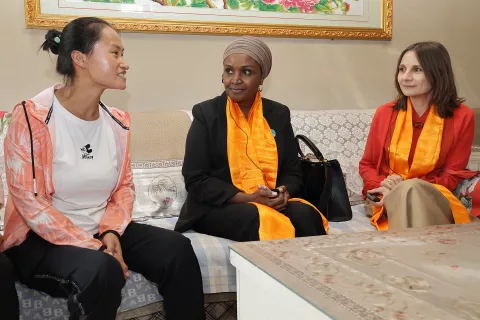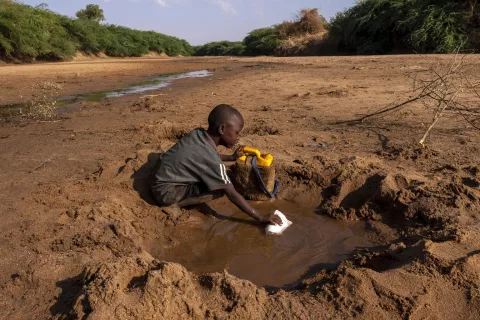Focusing on Child Health: Child Health Development Cooperation
Eight African countries and China come together to make children's health a priority
- Available in:
- 中文
- English
As China plans its next phase of cooperation with the African continent, the Department of International Trade and Economic Affairs of the Ministry of Commerce, Department of International Cooperation of National Health and Family Planning Commission and UNICEF hosted discussions with representatives from eight African countries in Beijing to ensure that newborn health is a top priority to be reflected in bilateral plans for China-Africa development cooperation.
The meeting on 22–24 March followed commitments from the Forum on China-Africa Cooperation in December in South Africa, when President Xi Jinping announced that China will launch "special programmes focusing on women and children" in 10 China-Africa cooperation plans for 2016–2018.
"The dialogue presents a unique opportunity for China and African countries to share their experiences and explore opportunities for collaboration in reducing avoidable maternal, newborn and child deaths which is at the top of UNICEF's global agenda," said Yoka Brandt, UNICEF Deputy Executive Director, in her opening comments.
According to the UNICEF Generation 2030 Africa report, Africa will be home to the largest number of children younger than 18 years by 2025. By 2050, 39 per cent of all global births will be in Africa. "A failure to acknowledge this reality and to place greater investment in children, especially newborn survival and development, in education opportunities for girls and boys, in the protection of children and the empowerment of young people could mean that Africa may not achieve truly sustainable economic progress or the social stability that comes in equitable societies and with empowered people," said Brandt.
Represented in this recent meeting in Beijing were the Democratic Republic of Congo, Ethiopia, Kenya, Niger, Nigeria, Sierra Leone, Sudan and Zimbabwe.
During the two-day meeting, country delegates presented details of past collaboration with China and pointers on where new investments in newborn and child health could make difference.
Speaking on behalf of all delegations from Africa, Dr Desire Sibanda, Permanent Secretary at the Ministry of Health from Zimbabwe, reiterated the continent's commitment to reducing child mortality, highlighting that despite the challenges, many countries had made considerable progress to achieving the Millennium Development Goals reducing child mortality and maternal health.
Dr Sibanda acknowledged that lack of both financial and human resources had hampered some progress. But the African countries remain determined to build strong primary health care systems for women and children. “We share the same vision as China that investing in children's health is important for economic and social development,” he said, echoing the importance of the ongoing cooperation and exchange.
Yao Wenlian, Deputy Director General, Department of International Trade and Economic Affairs of the Ministry of Commerce welcomed the role that UNICEF could take in strengthening collaboration between developing countries. "We have partnered with UNICEF on 160 projects that have promoted the development of the child," he said, referring in part to work in the 1980s in China which helped establish national vaccine production and build the cold chain that resulted in country wide near universal vaccination coverage (>99%) in 2015.
Dr Feng Yong, Deputy Director General, Department of International Cooperation within the National Health and Family Planning Commission, outlined more than 50 years of China's contribution to 49 African countries. This included creation of an Africa Centre for Disease Control and staff training for national centres on disease control; tackling non-communicable diseases and vector-borne diseases like malaria and Ebola; building laboratories and health infrastructure; sending medical teams to carry out free diagnostic services and cataract operations; and working with Chinese pharmaceutical companies on technology transfer with African companies.
The pointers during this March meeting with African countries on where Chinese investments could add value covered medical and IT equipment, training and capacity development and support to planning, monitoring and evaluation. There is particular interest in potential investments contributing towards achieving the third Sustainable Development Goal on ending preventable deaths among children younger than 5 years by 2030.
"I am convinced that the seeds planted in the past two days will help children in African countries to survive and thrive," said Rana Flowers, UNICEF China Representative, at the meeting's conclusion. UNICEF, she added, would continue to contribute technical expertise and experience that would lead to impressive results for children.
Media contacts
About UNICEF
UNICEF works in some of the world's toughest places, to reach the world's most disadvantaged children. Across 190 countries and territories, we work for every child, everywhere, to build a better world for everyone. For more information about UNICEF and its work for children visit www.unicef.org.
| Visit UNICEF China website: www.unicef.cn Follow us on Sina Weibo: http://weibo.com/unicefchina Tencent Weibo: http://t.qq.com/unicef Wechat: unicefchina |




